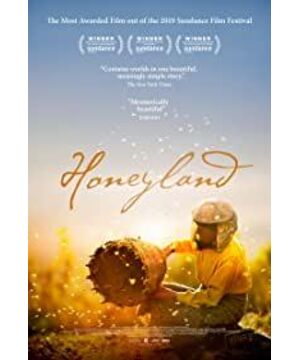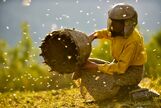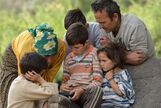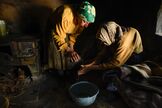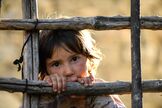It’s a humanistic documentary. It records the life of a female bee-picker living in North Macedonia. It is said that it took three years and thousands of hours to shoot, and finally it was condensed into 87 minutes. North Macedonia speaks Turkish, and the photographers could not understand what the characters were saying when they were shooting. Only when they were shooting silent films, they would translate them when they came back, which often yielded unexpected results.
This piece is really beautiful, literally beautiful. I wish that every frame is picturesque, the golden ratio and the use of light are reflected to the extreme, even the composition of sports shots is very particular.
North Macedonia originally belonged to Yugoslavia, and later became independent. This land once belonged to the Roman Empire, the Byzantine Empire, and the Ottoman Empire. It has always alternated between prosperity and war. Now the people here should all be Muslims. The heroine and the seriously ill old mother live in an uninhabited village (this is a Turk village, everyone returned to Turkey, but this one is the only one), there is no electricity, no running water, and the light relies on candles. For water, it usually depends on the river. , in winter only snow melts. The heroine will go to the crevice of the cliff alone to collect the honeycomb as the seeds for her beekeeping and honey collection, and bring it home to let the bees slowly build the nest and produce honey to make a living. Later, he came to a nomadic family with seven children, raised cattle, and later learned beekeeping from the hostess, but because he wanted to make a big deal to get all the honey, his bees and the hostess' bees died, and the cattle were inexplicable. Many of them died, so they moved in and out. Later, the heroine sent her mother away one winter, climbed the cliff again under the warm winter sun, collected new bee species, and life continued.
The heroine seems to have no sense of poverty. She didn't want to expand the scale of beekeeping, and she didn't want more money. As long as she had enough to live and support her mother, it was enough. Nothing could change her either. Neighbors ruined her livelihood. Her mother died. Even with anger, sadness, and despair, in the end, she continued to live on her own terms. Even though she seemed to want some changes: she would want to get married, have a child, and leave this deserted village, she hadn't in all these years. It can be said that she has not really tried it, but the reason may be that it is not worth changing, right? Just like the nature of "Wolf Feeding", I just need to live alone and that's fine.
The neighbors of the heroine will first make people think: poverty will make people ignorant and vulgar, and thus continue to live in poverty, which is a vicious circle. Therefore, they would speak ill of their loved ones and complain to each other; they would deliver a calf, and when they saw it was a bull, they would throw stones at the cow; the dead cow would be dragged by a tractor and thrown into the wilderness to be fed to the vultures, without the slightest thought Know love and respect. Raising cattle, gnawing away a piece of grass and then changing the ground to continue gnawing; keeping bees, destroying the nearby beehive and patting the buttocks and leaving. So they present this scene: stupid human beings always feel that they need more and spend their whole life exploiting nature for their desires.
The original essence of capital is the exploitation of nature. After it is destroyed, it goes away. With the accumulation of capital, it is transformed into the exploitation of human beings. If you think about it this way, these vulgar ignorance in my opinion have no pattern, is it just a microcosm of the lack of human intelligence? Is there such a side to the self-conceited sense of superiority? We think we're getting higher and higher, yet we're still exploiting and destroying the world in less direct ways.
There is a sentence in "General History of the World": "Although human beings are gaining more and more knowledge and are more and more able to modify the environment according to their will, has the environment become more habitable?" The means of modifying the environment is called knowledge, using knowledge to make To maintain balance with the environment is called wisdom. So wisdom and our definition of knowledge, cleverness, may be completely different dimensions. Wisdom may not be the ability to think and analyze, it may be a biological instinct. Creatures with this instinct have no other desires than to survive and reproduce, so they are the exact opposite of us: they seem to be mediocre, but let the traces of their own species survive on this planet. such as whales
Whales (and dolphins, too) have huge complex brains, as Ackerman mentioned in "The Moon Behind the Whale", but we still don't understand what their developed brains are used for: there is no sign that they are changing themselves , and there is no excessive self-replication, they let themselves ignore everything, never evolve, and never destroy. So wisdom may be to know the laws of this world from the beginning, and to follow it calmly, not to take a step, not to be vigorous, just to continue.
Finally, I wrote down a sentence I liked: "I can't get out, I'm like a tree".
View more about Honeyland reviews


